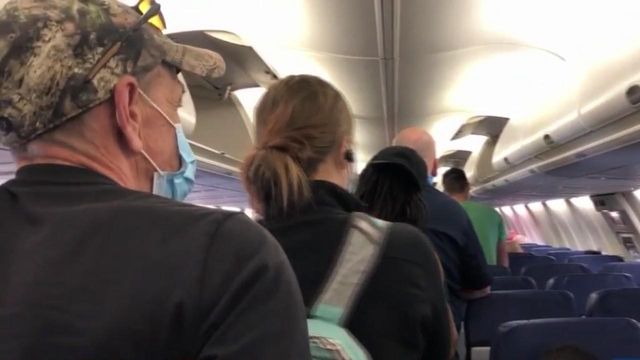How flying has changed with the pandemic
After the coronavirus outbreak pushed passenger traffic to a record low this spring, flights are slowly starting to pick up at Raleigh-Durham International Airport, with more scheduled next month.
Posted — UpdatedAfter the coronavirus outbreak pushed passenger traffic to a record low this spring, flights are slowly starting to pick up at Raleigh-Durham International Airport, with more scheduled next month.
While a lot of people are choosing not to fly, those who must travel — for work, an event or family emergency — should know what to expect.
5 On Your Side sent our executive producer on a recent roundtrip. She packed multiple cameras and recorded every step of the way, from check-in to security lanes to the flight itself.
One concern involved exiting the plane. Passengers were bunched together, even after a reminder from the flight attendant to social distance.
Frequent flier Mercedes De la Rosa-Sherman, who was headed to Atlanta, was traveling for work, the first time since mid-March.
She was relieved to find passengers being spaced.
"I actually was not expecting the middle row to be empty," De la Rosa-Sherman said. "It makes me feel it’s safer."
Masks are also required on flights.
The airline’s oxygen mask message, one we all know, even includes an adjustment to "remove your face covering before placing an oxygen mask over your face."
At check-in, plexiglass was in place.
Going through security, we noticed TSA officers handling each traveler’s ID. You can request they change gloves, but the TSA urges travelers to wash hands before and after security checks.
You can bring hand sanitizer. The TSA is temporarily allowing up to 12 ounces per person in your carry-on. It will be screened separately, so you might want to allow time.
The TSA also says to put extras like wallets, keys and phones in your carry-on as another step to reduce touch points.
Our producer said hand sanitizer stations seemed limited, without many signs to point them out.
RDU Chief Executive Michael Landguth tells us the number will soon be tripled, signs will be added and seating will change.
"Shorty we will have seat coverings on some seats. That will block some seats to allow social distancing to occur in those gate holding areas," said Landguth.
When we landed in Atlanta, for example, we noticed seats are not blocked, but reminders to social distance are front and center, along with hand sanitizer stations.
Just like with everything else, when flying, we have to do our part.
Most importantly: Wash your hands after all those touches, from check-in screens and security bins, to railings and restroom doors.
Whether it’s safe to fly ultimately depends on individual circumstances: age and health issues, paired with the importance of the trip and the level of risk and inconvenience one is willing to accept. There is plenty to think about and do as we get back in the air.
• Credits
Copyright 2024 by Capitol Broadcasting Company. All rights reserved. This material may not be published, broadcast, rewritten or redistributed.





